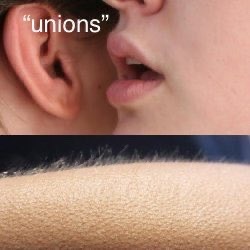#labour movement
Text

12K notes
·
View notes
Text
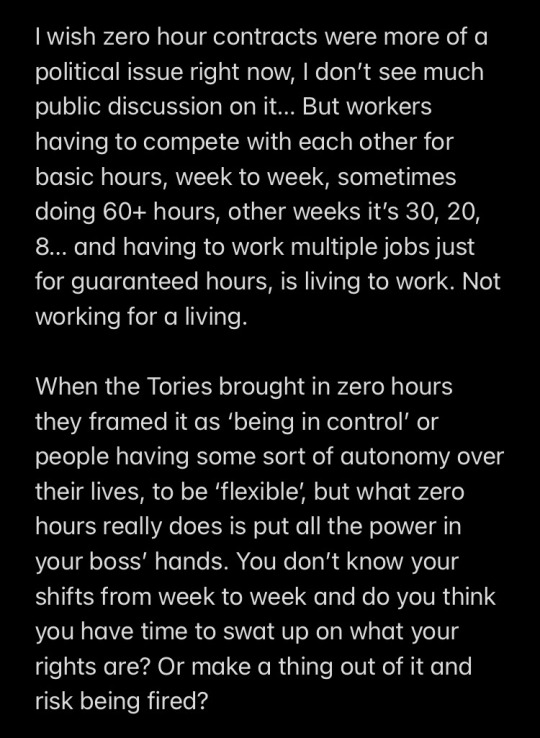

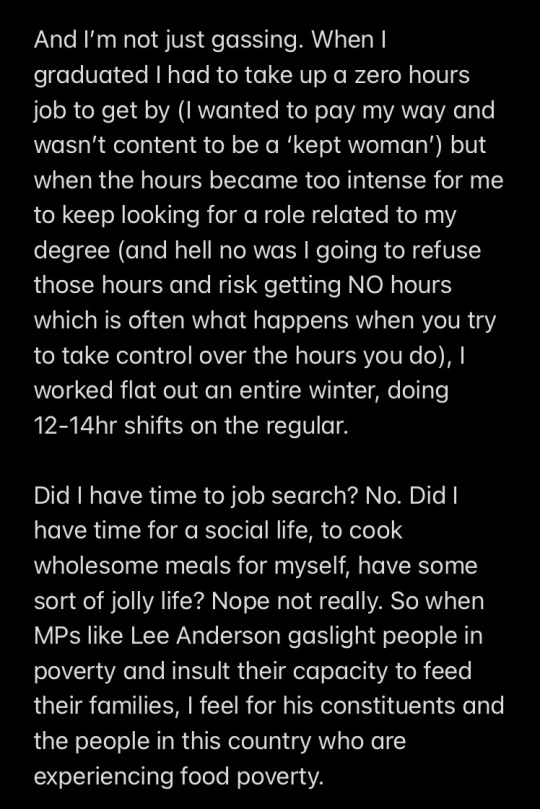
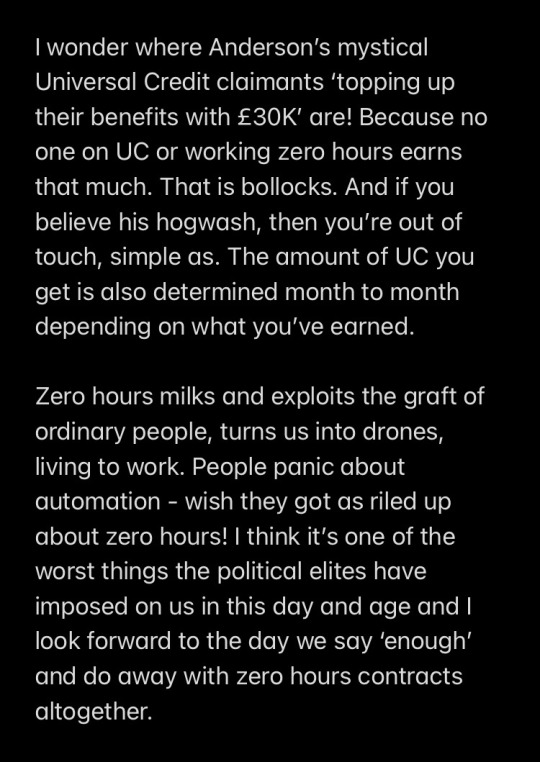

Who else thinks zero hours contracts f*cking suck ⁉️ Bit of a long one, but this is just my thoughts and personal experience with this hellish aspect of working life in the UK. I think we deserve better!
#uk politics#zero hours#labour movement#workers rights#my thoughts#political rant#ranting#tory austerity#fuck the tories#unionise#tory britain#politics#workers unite
20 notes
·
View notes
Text
I’ve had some conversations recently in which the point arose that, considering how Reagan et al responded to the AIDS crisis, seeing the mismanagement of covid as at least partially intentional is not all that much of a conspiracy theory. I think we need to read this as an effort by capital to sabotage ground-level organising.
Covid has placed enormous pressure on working classes, as well as other marginalised groups, at a time when the class interests of those in power were threatened more directly than they have been for decades. Not only has the overwhelming narrative been the imperative to ‘get back to normal’, but this has been during - and indeed in direct response to - some of the largest popular movements for changing entrenched systems in living memory, especially in specific regions.
Of course union action continues to make strides in spite of labour movements being largely calcified in the West toward the end of the last century, but I’ve read that BLM was the largest protest movement in American history, and this was at the same time as mass scale protests in India, Hong Kong, Mexico, which were not focused on race. This could have been (and indeed can still be) catylised into a popular internationalist movement for proletarian gains, but has been largely buried in favour of record profits for corporations, and obfuscated by merely symbolic victories such as the trial of Derek Chauvin, and the ongoing jangling of keys that is Donald Trump.
I’ve heard many say that BLM lacked a clear goal and that’s why it started to fizzle; well yeah so did the French Revolution, but it still stands as one of the greatest precedents in history of the power of regular people to exact vengeance against their enemies. In fact, the measures taken to mitigate covid, such as remote working, served to demonstrate our proficiency in self-organising, which by extension also attests that managers have no real function but to threaten and steal labour. And such organisation can be multi-pronged: we can at once dedicate ourselves to productive labour, ideological gains, and leisure, and ultimately these efforts will compliment and enrich one another. We may even call this praxis.
Sometimes, perhaps more often than not, the ends which protest seeks is to prove that victory is within our grasp. Casting the statue of Edward Colston into the sea may have done little to improve the material conditions of Bristol’s people of colour, but it undoubtedly improved people’s mental wellbeing, and empirically highlights that we have the means to effect the change we seek without appealing to bourgeois authority.
A better world is possible. But sometimes ‘better’ must be read as the comparative it really is. A world in which the Tories aren’t able to deport masses to Rwanda is undeniably better, even if we still don’t have a nationalised solar power grid and so on. And there will always be greater improvements to work toward, more practical gains to win. We ourselves must ply the bellows.
All of this is simply to remind us: agitate, because we need all your enthusiasm; educate, because we need all your intelligence; organise, because we need all your strength! Together, we can break their haughty power.
#class struggle#class war#class consciousness#workers movement#workers' movement#original#labour movement#proletarian solidarity#international proletarian solidarity
80 notes
·
View notes
Text
Meeting today + Nov 12th Day of Action
Labour for Palestine via Action Network
Union activists from the country are joining our public meeting tonight to strategize how to put the labour movement into action on Palestine. Will you be there?
Labour for Palestine: General Meeting
WEDNESDAY, NOVEMBER 8TH
8PM ET (5PM PT, 9PM AT)
On Zoom
REGISTER HERE
This meeting is open to everyone. New supporters welcome!
We'll share some of our recent victories, talk about upcoming events and opportunities, how you can contribute, and connect you with others in your union and region.
Sunday, Nov 12: Pan-Canadian Actions
Last weekend saw historic mobilizations for Palestinian Youth Movement's international day of action. Tens of thousands of people took to the streets in 30 cities to demand a ceasefire, to stop the siege on Gaza, and an end to Canadian complicity.
Now, we're building on that momentum. Labour for Palestine has endorsed the Sunday November 12th Canadian day of action as the next step in pressuring our government to stop selling arms to Israel and end its support for genocide.

Over 200 organizations, unions, and faith groups have endorsed November 12th and are organizing demonstrations.
Find one near you, or organize your own: Click here for a list of all Canadian demonstrations.
#Canada rallies#protests#labour movement#free Palestine#Palestine#pan-canada#action network#update from what i get in my email from action network! hope this helps!#angel posts#protest update
4 notes
·
View notes
Text
Both are unlikely political sensations who were long consigned to the fringes: Bernie Sanders, an octogenarian US Senator who inspired an army of voters far younger than himself; and Mick Lynch, a former blacklisted construction worker and child of Irish immigrants who, as the leader of the Rail, Maritime and Transport Workers Union (RMT), shot to national prominence when he humbled hostile but underinformed broadcast journalists. “I think Lynch is touching a nerve,” Sanders says.
The de facto leader of the US left has swung his considerable political heft behind a new campaign – Enough Is Enough – launched to fight Britain’s mounting cost of living crisis, which was founded in part by Lynch and the RMT. It has certainly touched a nerve: at a recent rally in Clapham, south London, many of those who had queued around the block were turned away for lack of space. “‘Enough is enough’, funnily enough, is an expression we use a lot here,” Sanders says. “People are sick and tired of often working longer hours for low wages; sick and tired of their kids having a lower standard of living than them; and they’re sick and tired of billionaires getting richer and richer while they fall behind.
“Why, with all this new tech out there, are they not seeing an improved standard of living? Why not more equality, rather than less equality? Why are living standards deteriorating, not improving? Lynch is asking that, Enough Is Enough is asking that – and it’s hitting a nerve, because people are tired of being ignored while the rich get richer.”
Political cut-through is something Sanders knows a lot about, but it was only something he really achieved in his 70s. Born into a working-class Jewish family in New York, he became the mayor of Burlington, Vermont, at 40, later becoming a House Representative and a Senator. A longstanding independent, albeit one who has frequently allied with the Democratic party, Sanders championed causes long eschewed by mainstream Democrats, such as universal healthcare, the abolition of student fees, workers’ rights and the anti-war movement. But his dramatic rise – when he was transformed from a marginalised figure to a frontrunner for the Democratic presidential nomination in 2016 – was driven by two major factors.
One was the financial crash, which exposed inequalities and insecurities that disproportionately fell on the backs of younger Americans. The other was the expectations raised by the election of Barack Obama in 2008, which, for millions of Americans with stagnating living standards, ultimately felt dashed. Although neither his 2016 or 2020 bids succeeded, they mobilised a movement that revitalised the US left and transformed it into a major political force in the Democratic party and beyond.
This brings his attention back to a perennial passion – and what he wants to talk to me about: the prospects of the US labour movement. We speak over the phone, but he hits all his rousing lines with the zest of a platform rally. The thread that runs through all his answers is class politics. This is less of a novelty in progressive politics on the British side of the Atlantic – to rousing cheers at a recent Enough Is Enough rally, Lynch proclaimed: “The working class is back” – but it was long considered alien in a US that peddled a myth of classlessness. This was a politically convenient myth in a country where, Sanders notes, three rich men have more wealth than the poorest half.
But the Brooklyn-born Vermont senator has a new mission: to deploy his political weight behind efforts to unite the struggles of the US and British labour movements. On Wednesday, Sanders will bring his trademark oratory to an RMT rally in central London.
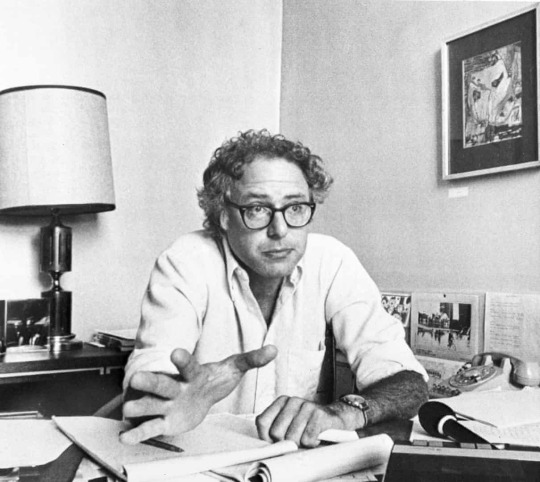
Sanders as mayor of Burlington in 1981.
The labour movements in the US and Britain are significantly weaker than most of their western counterparts. In the US, trade unions had been long hobbled by “red scares” and anti-union so-called “right to work” laws, but they were severely weakened under Ronald Reagan, whose administration, in 1981, fired more than 11,000 striking air traffic controllers to send a salutory lesson to other workers. Today, little more than one in 10 US workers are unionised. British trade unionism did not suffer such a comprehensive rout, but the number of organised workers – about a quarter of the workforce – is half the level of the peak in 1979.
Does Sanders believe both labour movements are learning lessons? “I think what we’re beginning to see here in the US is a significant acceleration of trade union organising,” he says. “We are seeing more workers organising in unions, filing with the National Labour Relations Board [NLRB] to get certification – more than for a very long time.”
What has made him particularly optimistic is workers’ struggles in the union deserts of Starbucks and Amazon. Sanders recently joined striking Starbucks workers on a picket line in Boston. After more than 85 union organisers were fired by the coffee chain in recent months – the NLRB has filed multiple complaints against the firm – his support has boosted the national profile of the fight. “In Starbucks and Amazon, hundreds are joining unions – in Amazon, they’re taking on Jeff Bezos, the second wealthiest person in the world. We’re seeing struggles in university campuses, hospitals, nurses – we’re seeing unprecedented organising compared to what we’ve seen in recent years.”
But he touches on an apparent contradiction: “While the middle classes decline while the rich become richer and richer, there’s more support for the trade union movement in the US – people feel much stronger about unions than previously.” And he is right: last year, 68% of Americans told pollsters they approved of unions, the highest level since 1965, while polling in the UK has shown that most working-age Britons back the current wave of strikes. Yet that hasn’t translated into most joining a union. Why?
“In the US, corporations make it very hard for workers to exercise their constitutional rights to form a union,” Sanders says. “[Last Wednesday], the NLRB found Starbucks had fired workers and rescheduled those shop workers who were forming unions – which is illegal. We are seeing companies threatening workers that they’ll go to China. There’s massive corporate opposition to workers forming unions in the country.”
He highlights another formidable barrier: “We’ve got a media in the country which is certainly not sympathetic to unions, which will very rarely discuss the benefits of unions, like better working conditions, wages, pensions, et cetera, et cetera. The media is obviously owned by a handful of large corporations who don’t talk about class issues, economic issues. All of that contributes to making it harder for workers to become organised.”
But there is a tradition of militancy among US workers, despite attempts to scrub it out, not least in the 1950s under McCarthyism. During the Great Depression of the 1930s, waves of strikes rippled across US society. Does Sanders see a parallel? “Yes, I do. In the 1930s, there was a massive increase in organising and membership, and workers fought valiantly – they did sit-ins, took on powerful interests. What we are seeing now is real frustration in terms of inflation accounting for wages, with the average US worker earning less than almost 50 years ago – taking into account productivity gains, slightly worse than then. That’s insane!”
Given the likes of Starbucks have so long succeeded in suppressing labour organising, why has there been a blaze of activity? “I’ll tell you why, in my view: a lot of Starbucks workers are younger people. Many of them have college degrees and they’re looking around them: their wages aren’t keeping up with inflation, they can’t afford housing or healthcare or student debt, they’re falling further and further behind compared to their parents, and they’re standing up to the owner of Starbucks – Howard Schultz – saying: ‘You’re worth $4bn! What’s your problem with allowing us to organise workers?’ And his response is simply to try and fire workers and intimidate them. To some degree, this is a multiracial generational fight – primarily of younger people, but not exclusively – standing up to a billionaire.”
Starbucks has denied all allegations of retaliation. A spokesperson told The Guardian previously that “these individuals are no longer with Starbucks for store policy violations. A partner’s interest in a union does not exempt them from the standards we have always held. We will continue enforcing our policies consistently for all partners.”
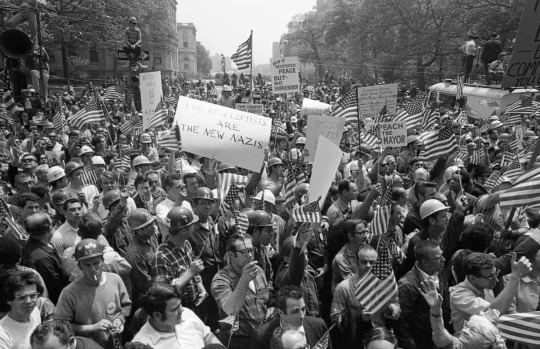
A pro-Vietnam war protest in May 1970 that descended into the Hard Hat Riot.
But the relationship between the US labour movement and younger progressives has not always been harmonious, to say the least. In the 1960s and 1970s, US labour was led by the gruff former plumber George Meany, a zealous supporter of the Vietnam war, who relished denouncing student protesters as “kookies”. The nadir came in the form of the so-called Hard Hat Riot of 1970, when hundreds of construction and office workers physically attacked student protesters in New York. Is there hope this time for solidarity between trade unionists and the rising US younger left?
“That kind of unity is something we are working on very hard,” says Sanders. “I’ve now held three rallies with progressive union leaderships – with Sean O’Brien, the new president of the Teamsters, and Sarah Nelson, the president of the Association of Flight Attendants – in Chicago, Philadelphia and Boston. What we see at these rallies is unionists coming together with younger progressives – and the unity of those forces, young people fighting for economic and racial justice with a union movement, has incredible potential. To answer the question: it’s absolutely imperative we bring them together – and we are trying to do that.”
When US workers fought bosses in the 1930s, they enjoyed the advantage of the sympathy and political muscle of the president, Franklin D Roosevelt. Joe Biden has repeatedly vowed to be “the most pro-union President ever”, but his career has long been wedded to establishment and “centrist” factions in the Democratic party. Sanders says he knows the President “reasonably well” and points to the 110-page policy platform his team hammered out with Biden’s campaign team in 2020, with taskforces covering areas ranging from healthcare to the environment.
“What the President recognised is that there was, and is, a movement of working people, of young people, who are sick and tired of the status quo, and I think, when we did the American Rescue Plan [to help the US through the pandemic], it was one of the most consequential pieces of legislation for working people in modern history. When we did the Build Back Better legislation [a huge package of measures related to social policy and the climate crisis], it had the support of the President for a multibillion-dollar transformational programme, and it was sabotaged by a couple of conservative Senators, but he said: ‘I will stand by the working people of the country and take on the big monied interests.’”
This differs from some of the more pessimistic narratives about Biden from the US left, which is still reeling from Sanders’ two presidential-nomination defeats. But his optimism springs not so much from naivety about Biden as from a firm belief in the ability of struggles from below to bend the powerful to act in workers’ interests. “You’re seeing a progressive movement of people in every state of this country which is beginning to go beyond incremental politics, asking: ‘How does it happen that every rich country on Earth – including the UK – has universal healthcare, while we have a dysfunctional system? Why in other countries is university education free, when in this country it’s outrageously expensive?”
I put it to him that his campaigns tapped into discontent, but magnified it and gave it direction. “What my campaign did was to raise issues, and the establishment suddenly discovered millions of people not happy with the status quo who wanted transformational change,” he says. Sanders gives the example of the President last week committing to cancel up to $10,000 (£8,500) of student debt. “Did it go as far as I wanted? No, but is it a significant step forward to alleviate the terrible burden that young people are suffering? Yes, it will help a lot.”
Another example is the recently passed Inflation Reduction Act, which, among other things, lowers prescription drug prices and promotes clean energy. “Again, it didn’t go as far as we campaigned on, but, on many of those issues, part of what we demanded has been implemented.”
What next for the US left? The youthful optimism of this 80-year-old senator appears limitless. Next, he says, they will grow the labour movement and tie it to the progressive movement. “You may or may not know, but, come January, in terms of politics, there will be a stronger underlying progressive presence in the House than at any time in modern history. We are seeing accomplishments at the political level, at the organising level, so we are making progress.”
Yet all of this relies on forcing a president to go beyond his comfort zone. Sanders remains one of the most popular politicians in the US, and his campaigns encouraged a galvanised US left to dare to dream of achieving outright political power. What lessons would a future campaign learn from his attempts, which transformed political debate in the US, but failed to secure him the presidency?
Sanders does a laugh anyone will recognise – the “I do not want to talk about this now” laugh. “That’s a long question – a very long question!” Again, he highlights his campaigns’ signature accomplishments – underlining that “a significant part of society is not happy with the status quo, that they’re sick and tired of income and wealth inequality and they want fundamental changes in our economic and political system”. But he clearly believes he was hobbled by establishment hostility. “When you take on the political establishment and the media establishment and the corporate establishment … it’s not an easy thing to do. We need time and we certainly didn’t have that luxury.”
I wonder, too, if he recognises that Enough Is Enough has emerged in large part because of a vacuum left by a Labour leadership that has abandoned any pretence of transformative change. Sanders is diplomatic. “I think it’s not dissimilar to what we’re seeing in the Democratic party here – I’m not commenting on the Labour party; I don’t know enough,” he says. Referring to traditional left-of-centre parties struggling in the global north, he adds: “Because working-class people are increasingly alienated from the political process, those parties are not delivering for them. That’s why the Democrats have a choice to make: are they the party of the working class or the elite?”
The legacy of Sanders, surely, is that he brought together otherwise fragmented and disillusioned pockets of discontent into a highly visible and articulate movement with confident demands. Maybe – just maybe – he can help pull off the same trick by helping to unite the increasingly assertive labour movements on both sides of the Atlantic.
#us politics#news#interview#sen. bernie sanders#biden administration#labour movement#united kingdom#great britain#europe#european politics#Mick Lynch#Rail Maritime and Transport Workers Union#Enough Is Enough#worker's rights#worker's union#unions#union workers#National Labour Relations Board#amazon#starbucks#jeff bezos#Howard Schultz#great depression#McCarthyism#red scare#the guardian#2022#reaganomics#Americans rescue plan#build back better act
40 notes
·
View notes
Text
We need a fucking wildcat general strike in Ontario. We need it now. Doug Ford and his cronies cannot get away with using the notwithstanding clause to strip the workers’ rights!
4 notes
·
View notes
Note
Doesn’t that furries in tech post actually paint them as shit heads though given the state of things. I mean between the right wing and the pedos and the crumbling telecommunications and the disorganization and monetization and spying and ads
i genuinely don’t know how to respond to this but i beg you to speak to another human outside and also understand the labour movement.
half of these issues aren’t brought about by “shit heads” they’re brought about by the fact tech isn’t unionised and workers don’t have the power to stand up against programs they hate, apart from simply quitting - and the right wing shit heads will be Your Boss
this is why workers at Google, Kickstarter, ABK, Ubisoft and more have started the process of unionising !
(for those in the UK, join UTAW btw 👀)
4 notes
·
View notes
Text
Me: "hey game developers, especially AAA ones, are getting laid off en-mass and it's awful for our industry"
Gamer: "well I only play INDIE games and the problem with AAA games is they are creatively bankrupt"
Me, slamming my fists on the table like a baby: "WHAT ARE YOU TALKING ABOUT THIS IS ABOUT A BUSINESS PROBLEM PERPETUATED BY CAPITALISM NOT A STATEMENT ON CREATIVE DECISION MAKING"
#look I think AAA should make weirder games also but I wish we stopped treating that like some kind of solution and not just a fun idea#the problem is capitalism. its always capitalim#its not like AAA studios would have less problems if they made weird indie games lol#also hey spoiler alert: indie studios need to organize their labour too#in fact I think the organizing movement would be stronger if more indies adopted it first#anyway im busy so imma mute some posts now#thoughts#blog
5K notes
·
View notes
Text
Coal Miner's Book Available Again After Over 100 Years
I have been keeping rather quiet about a writing project that I have been involved with, as it isn’t my usual sort of thing. I have been rather reticent at promoting it as I haven’t been completely sure how to go about it. This all came about rather suddenly. My wife’s cousin was at a pub in Wigan and began discussing about her great- great-grandfather, who lived in the town. Samuel Woods grew up…

View On WordPress
#Coal Mining#History#Ince#Labour Movement#Lancashire dialect#Local History#MP#Sam Woods#Samuel Woods#TUC#Victorian#Visions of the Mine#Walthamstow#Wigan
0 notes
Text

Glasgow May Day 2022, we love to see it.
77 notes
·
View notes
Text

Let's take a moment on this Workers' Day to recognize the important role that workers play in shaping our society and economy. Your labor makes a difference, and we appreciate all that you do. Keep up the great work
Here is something for everyone CLICK HERE
#labour#labor#labor day#happy may day#happy labour day#major tom#labour movement#i stand with laour#i stand#1st may#1er mai#u.s. department of labor#local union#wages
0 notes
Text

Srećan...
#prvi maj#medjunarodni praznik rada#international workers' day#labour day#may day#labour movement#working class
1 note
·
View note
Text
‘War of attrition’: why union victories for US workers at Amazon have stalled
"So far, no Amazon union campaign has come close to replicating the Staten Island victory. ALU came up short in union elections in Albany, New York, at another warehouse in Staten Island, and pulled a union election petition shortly after filing in California, though the union is currently supporting a union campaign in Kentucky and at Amazon’s air hub outside Cincinnati, Ohio.
"The Retail, Wholesale and Department Store Union came up short in the rerun of a union election in March 2022 at an Amazon warehouse in Bessemer, Alabama, after the NLRB ordered a new election due to Amazon’s misconduct during the first election. The second election results have yet to be finalized. Unfair labor practice charges are still being adjudicated and objections to the elections, which include 400 contested ballots that could sway the result, are yet to be decided.
"In the meantime, efforts to pass sweeping labor law reforms in Congress have stalled. The House passed the Joe Biden-backed pro-union Pro Act in 2021, but the bill did not reach a Senate vote. Reintroduced in the House and Senate this year, the act now faces a House under Republican control that is unlikely to vote in its favor."
#workers rights#workers#working class#trade unions#unionisation#unionization#unions#strikes#amazon#staten island#alu#labour#labor#labour movement#labor movement#pro act#joe biden#congress#us#american politics#politics#unionism
0 notes
Text
Does anyone have any advice on workplace unionising in the UK? I'm a member with Unite as an individual.
Basically everyone is getting screwed here in a company that pays below market wages for most roles.
Please note I am still on probation until June and cannot get involved in any action that might happen in the future, but I want to support them as much as possible.
#uk#labour movement#unionising#union#strikes#worker exploitation#help#acab#labour#workers#socialism#communism#syndicatism
0 notes
Text
Renewed War Against Workers And The Poor: TPAP-M Alerts Nigeria's Labour Movement And Working People
Renewed War Against Workers And The Poor: TPAP-M Alerts Nigeria’s Labour Movement And Working People
(Being Text Of A Statement By TPAP-M 21/08/2022)
The current call by some State Governors of Nigeria that the government pays off certain categories of civil servants is a clearer declaration of war against the working people of Nigeria. It is an intensification of the IMF/World Bank War that escalated especially under the military wing of Nigeria’s ruling class in the late 1970s and picked up as…

View On WordPress
0 notes
